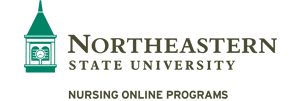The term “burnout” has garnered much attention over the past few years. While nurse burnout has always been an issue, the COVID-19 pandemic exacerbated the issue.
The Master of Science in Nursing (MSN) in Administrative Leadership in Nursing online program at Northeastern State University equips nursing professionals with the skills and knowledge necessary to support their teams and aid in preventing burnout.
A new study by the National Council of State Boards of Nursing (NCSBN) projects that nearly 900,000 registered nurses (RNs) intend to leave the workforce by 2027. This represents almost one-fifth of the 4.5 million total RNs practicing today.
It’s no surprise, then, that nursing administrators across the country grapple with the challenge of finding innovative ways to combat nurse burnout and retain skilled nursing professionals. With the right tools, these nursing leaders can mitigate the burnout trend and more effectively retain their nursing staff. First, it’s important to understand the root of the problem — as well as concerning warning signs.
The following represents a step-by-step approach to addressing current and potential burnout among nursing staff.
Identifying Warning Signs of Nurse Burnout
Nurse burnout involves depersonalization, emotional exhaustion and a diminished sense of personal accomplishment. The high-stress environment, long working hours and the emotional demands of patient care contribute to this phenomenon. Nursing leaders must be proactive in identifying the warning signs of burnout to mitigate its impact on both the affected individuals and the healthcare system as a whole.
Early identification of burnout is crucial for timely intervention. Nursing leaders must be trained to recognize burnout, including changes in behavior, decreased productivity and signs of physical and emotional fatigue. Implementing regular check-ins and creating an open and supportive environment can help in early detection and intervention.
Successful Nurse Retention Strategies
Retaining experienced and talented nursing professionals is paramount for the stability and effectiveness of healthcare services. Some of the key strategies for nurse retention include the following:
- Professional development opportunities: Providing opportunities for continuous learning and career advancement can lead to higher job satisfaction and retention rates
- Recognition and appreciation: Regularly recognizing and rewarding the hard work and dedication of nursing staff boosts morale and job satisfaction
- Supportive leadership: Nursing leaders who are approachable, supportive and actively involved in the well-being of their team contribute to a positive work environment and higher retention rates
- Competitive compensation and benefits: Offering competitive salaries and comprehensive benefits packages is essential for attracting and retaining skilled nursing professionals
Measuring the Impact of Retention Strategies
Investing in nurse retention strategies is essential for maintaining a stable and experienced nursing workforce. The effectiveness of these strategies can be measured through various metrics such as turnover rates, job satisfaction scores and patient outcomes.
By systematically evaluating the impact of retention initiatives, nursing leaders can make informed decisions and continuously improve their approaches.
Work-Life Balance
Achieving a balance between work and personal life is a critical component of preventing nurse burnout. Flexible scheduling, adequate staffing and supportive policies can contribute to a healthier work-life balance.
Nursing leaders must advocate for these changes and work to create a culture that values and supports the well-being of nurses.
Mentoring and Support Programs
Mentoring programs pair less experienced nurses with seasoned professionals, providing a valuable support system. These programs facilitate knowledge transfer, enhance job satisfaction and contribute to a positive work environment.
Nursing leaders are crucial in establishing and maintaining these programs, ensuring all nurses have the necessary support and guidance.
Preparing Nurse Leaders to Address Burnout
Our understanding of burnout has evolved over the years, with increased recognition of its impact on both individual healthcare providers and the healthcare system as a whole. Interventions to curb the detrimental impact of burnout include implementing wellness programs, providing access to mental health resources and fostering a supportive work environment.
Yet, those strategies require a solid foundation to operate as viable solutions. The online MSN in Administrative Leadership in Nursing program at Northeastern State University provides nursing professionals with the ability to lead effectively.
Courses within the program cover a range of topics from leadership and management to healthcare policy, all of which contribute to a comprehensive understanding of how to protect nurses from burnout and ensure the delivery of high-quality patient care.
Mitigate Nurse Burnout With an MSN in Administrative Leadership in Nursing Degree
Nurse burnout and retention are complex issues that require a multifaceted approach. Nursing leaders are at the forefront of this challenge, tasked with creating supportive environments, implementing effective retention strategies and ensuring the well-being of their teams.
Programs such as Northeastern State University’s online MSN in Administrative Leadership in Nursing play a crucial role in preparing nursing professionals for these leadership roles, equipping them with the skills and knowledge necessary to navigate these challenges and contribute to the improvement of healthcare services.
Learn more about Northeastern State University’s online MSN in Administrative Leadership in Nursing program.


